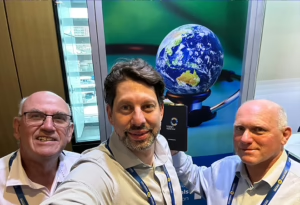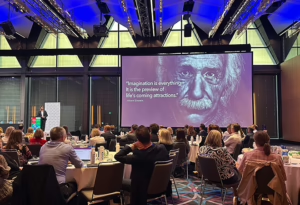As one of the peak bodies for the private hospital and day surgery sector, the APHA (Australian Private Hospitals Association) Congress brings together industry leaders and decision makers to discuss healthcare opportunities and challenges.
Representing Vision Hospital Group – which was also one of this year’s sponsors – were CEO James Thiedeman (centre) and General Managers Greg Brown (Day Hospitals; left) and Rodney Fox (Business Development and NSW/SA Operations; right).
According to Mr Thiedeman, the collaboration, networking and knowledge sharing that takes place at the APHA Congress is crucial to the growth of the private hospital industry.
‘This sector is an established and vital part of the healthcare system and needs to stay that way if Australia is to meet current and future healthcare demand,’ he says.
Hot topics at the 2023 Congress included:
- technology and AI
- healthcare workforce shortages and burnout
- funding models
- environmental sustainability.
Technological developments, AI and digital health
The burgeoning demand for health services will be a catalyst for alternative models of care, says Mr Fox.
‘This will require flexibility to extend beyond the current “bricks and mortar” mode to address the unmet demand.
‘As more digital solutions come online, services will increasingly be provided in the home or a home-like environment.
‘There was a lot of talk around Chat GPT availability being much sooner than anticipated and at a far more sophisticated level than most expectations. This technology allows greater access and analysis of “unstructured” data, including voice data,’ says Mr Fox.
‘BUT it is still early days – we are yet to truly understand its capabilities and where it fits in.’
Mr Fox says patients are increasingly comfortable with digital solutions.
‘We see that firsthand in our day surgeries as we move to digital pathways where appropriate. However, patients expect that the use of their data will be appropriate and clearly defined.
‘At the same time, the current Medicare system is not structured to support new models of care and care delivery.
‘Although some progress was made with telehealth during the pandemic, more needs to be done in this area.’
Healthcare workforce challenges
All healthcare providers, regardless of size, have been affected by staff shortages, says Mr Brown.
‘It’s across the board and the challenge is how to encourage workers, particularly nurses, back to the healthcare system.’
In the meantime, current staff must be supported to ensure they don’t burn out, he says.
‘Our duty of care encompasses both patients and staff at Vision Hospital Group.
‘Providing health services in this challenging environment is a balancing act. In my mind, keeping the lines of communication open, looking for efficiencies and remaining flexible are key,’ says Mr Brown.
Environmental sustainability
Mr Thiedeman learned the healthcare sector combined creates the equivalent CO2 footprint and waste as the fifth largest polluting country in the world.
‘We have an existential duty to minimise our pollution footprint,’ he says.
‘Many hospitals, including Vision Hospital Group through its OneVision ESG program, have already taken measures to reduce their footprint such as reducing paper use and single-use plastics.
‘I am also excited to bring back some new ideas to our sustainability team.’

